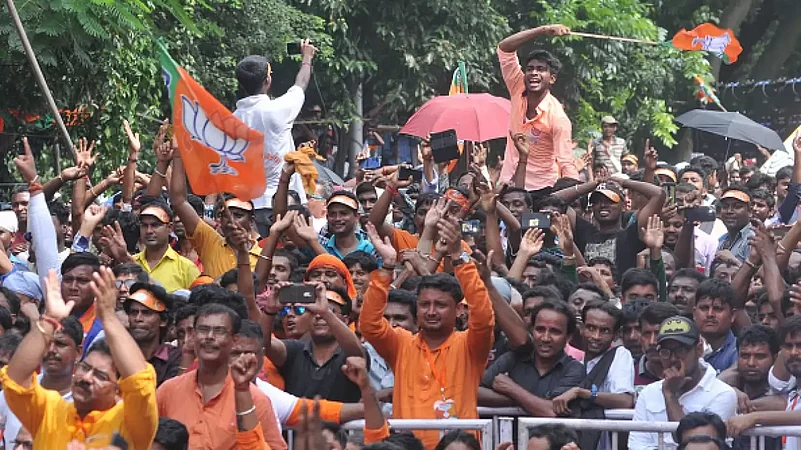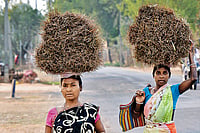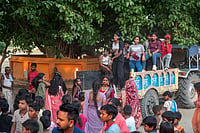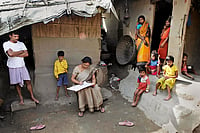In the winter session of the Jharkhand assembly, Bharatiya Janata Party (BJP) leader and Rajmahal MLA Anant Ojha once again raised the issue of ‘Bangladeshi infiltrators’. Lately, BJP leaders in Jharkhand have repeatedly been raising the issue and Ojha has been at the forefront of those cornering the Hemant Soren government in the state on the issue.
Ojha tells Outlook, “There has been a big demographic change in the Santhal Pargana. Here, numbers have become unbalanced due to Bangladeshi infiltrators. These infiltrators are involved in anti-national activities and extremist activities are also increasing in this area. Through the governor, we have demanded from the government that a task force be formed, a survey be conducted in this area, and these infiltrators be identified.”
According to Ojha, there has been a large-scale ‘Bangladeshi infiltration’ in the Santhal Pargana region. His demand is for the government to identify these ‘illegal infiltrators’ in the state based on the 1951 census and 1952 voter list — thereby initiating proceedings for a National Register of Citizens (NRC).
In the past year, BJP leaders have continuously raised the issue of ‘Bangladeshi infiltration’ and NRC in Jharkhand. In February 2023, during his visit to Jharkhand, Union Minister Amit Shah said in a meeting that due to large-scale infiltration in the state, the tribal population has reduced from 35 to 24 per cent. He also accused the Soren government of allowing this infiltration out of vote bank greed. Similarly, in June 2023, BJP President JP Nadda, during an election rally in the state, called ‘Bangladeshi infiltration’ a big issue for the state.
BJP’s Claims And District Administrations’ Report
The phrase “on a large scale or numbers” is frequently used to refer to ‘Bangladeshi infiltration’ for the state of Jharkhand. When asked if he or his party have any data about such infiltrators, BJP MLA Anant Ojha responds by claiming that there are lakhs of infiltrators in the state. He gives an example that in 1994 when he and his party agitated in Sahibganj against infiltrators, the district administration ended up identifying 7,672 Bangladeshi infiltrators, whose names were illegally included in the voter list.
Outlook cannot verify these figures. However, it has also been claimed that ‘Bangladeshi infiltrators’ are converting tribal girls in Santhal Pargana by marrying them and taking over their lands. But the investigation report of the concerned district administration on all these claims says something completely different.
In a petition filed in the Jharkhand High Court, it is said that Bangladeshi infiltration is occurring continuously in Sahibganj, Dumka, Pakur, Jamtara, and Godda districts of Santhal Pargana. The petition also says the number of madrassas is increasing and the infiltrators stay in these madrassas. Their names are included in the voter list and then these infiltrators marry tribal girls, convert them and take over their lands, says the petition.
While hearing this petition, the High Court sought information from the Soren government and the Union Home Ministry. On May 31, 2023, the special branch of Jharkhand state attached five point-by-point questions to the petition and sought answers from the SPs of Pakur, Sahibganj, Dumka, Jamtara and Godda districts.
After being asked by the Union Home Ministry regarding infiltrators, the Special Branch of Jharkhand wrote another letter on June 2, 2023, to the Deputy Commissioner, Senior SP, and SP of all the districts regarding ‘Bangladeshi infiltration’ in which it was said that information had been received about Bangladeshi infiltrators entering Santhal Pargana. “The infiltrators are accommodated in various madrassas of Santhal Pargana, after which their government documents are made. Then their names are put on the voter list and as part of a conspiracy they are settled. Requiring for all the information to be made available following the investigation,” said the letter.
According to the investigation report received from the SPs of four districts (except Sahibganj), only one case of such conversion was registered in the Lalmatiya Police Station of Godda district on February 22, 2023. Apart from this, information about how many madrassas have been opened in the last five years and how many madrassas are already running has also been received. The number of cases in the remaining three points has been reported as zero.
EP Ratios Of Pakur, Sahiganj Lesser Than ECI Norms
The issue of infiltration rings more in the context of Santhal Pargana of Jharkhand because Murshidabad and Malda districts of West Bengal are adjacent to Sahibganj and Pakur districts of Santhal Pargana, and both these districts of Bengal are adjacent to the Bangladesh border. And so, discussions around ‘Bangladeshi infiltration’ are especially a hot topic here.
BJP leaders including Anant Ojha mention these two districts specifically when talking about infiltration. Sahibganj Deputy Commissioner Ramniwas Yadav told Outlook, “We did not find any outsiders staying in any of the madrassas during the investigation. Only two Bangladeshi residents were found against whom a case has been registered. I don’t think there is any truth to what is being said.”
Yadav says that if infiltration had happened and infiltrators’ names had been included in the voter list, then the Elector-Population (EP) ratio should have increased to 70 per cent. He says that despite several awareness campaigns run by the district administration to get names included in the list of beneficiaries, the EP ratio of Sahibganj is only 56 per cent whereas the EP ratio should be 60-62 per cent, according to the Election Commission of India (ECI).
Even in Pakur, the EP ratio is less than the norms of the ECI. According to Deputy Commissioner Mrityunjay Kumar Baranwal, the EP ratio in Pakur is around 56 per cent. He told Outlook about the Jharkhand Special Branch’s letter and infiltration: “No information has been received regarding infiltrators in Pakur. No infiltrators have been confirmed. And no such thing has come to light in madrassas also.”
How Political Is NRC?
The population of Muslims in Pakur and Sahibganj is more than that of other districts in Jharkhand. Alamgir Alam is a minister in the Jharkhand government from Congress quota and has won from Pakur. He has been blamed for supporting infiltration on multiple accounts.
Alam tells Outlook, “The allegations that the BJP is making are baseless. Since they do not have any issues, as soon as the elections are near, they have started sloganeering Pakistani and Bangladeshi infiltrations. When their government was in power five years ago, I had said that it was a double-engine government (BJP government in the Centre and Jharkhand) and they should investigate where and how many Bangladeshi infiltrators are there and take action against them. But nothing was done. This is just an election stunt for them.”
Alam also says that if BJP leaders have any data regarding infiltrators then they must disclose it and provide proof, following which the government will assuredly take action.
Ojha and Jharkhand BJP President Babu Lal Marandi have said in election meetings that they will bring NRC as soon as their party forms the government in the state.
The Lok Sabha elections are just a few months away and the state assembly elections are also just a year away. In such a situation, how much will the NRC issue affect the elections? On this, senior journalist Madhukar tells Outlook, “The issue of infiltration and NRC can affect the elections in Jharkhand. Other states are examples of this. This is also understandable from the stronghold of BJP in Assam, Tripura, and West Bengal. The way BJP is raising this issue just before the elections in Jharkhand, it is only for votes. In the eyes of the BJP, infiltrators are only Muslims. Therefore, this NRC issue becomes religion-based for them, this is also what suits them.”
Madhukar believes that infiltration in Santhal Pargana is a fact, but no party is serious on this issue while everyone does vote-politics in its name. Madhukar says that even if the BJP comes to power, he does not think that the party will implement NRC.
S Ali, the President of the All Muslim Youth Association (AMYA), considers this a political issue. He tells Outlook, “I have been hearing about infiltration since 2002. The parties and leaders who gained power by fanning this issue lack an understanding of the history of the Santhal Pargana. They should read The Santhal Pargana Gazetteer of of1965, in which it is clear that the districts like Sahibganj, Pakur, Jamtara, Deoghar etc. have had Muslim rulers and Muslim population, whose language and culture have been Bengali. Earlier this entire area was under Bengal. Whereas after the partition of the country, it was not Muslims but people of other religions who had infiltrated into this area.”



























